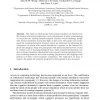Free Online Productivity Tools
i2Speak
i2Symbol
i2OCR
iTex2Img
iWeb2Print
iWeb2Shot
i2Type
iPdf2Split
iPdf2Merge
i2Bopomofo
i2Arabic
i2Style
i2Image
i2PDF
iLatex2Rtf
Sci2ools
108
click to vote
ICCHP
2004
Springer
2004
Springer
Neuropsychological Function for Accessibility of Computer Program for People with Mental Retardation
The extent to which people with mental retardation are benefit from the modern information technology is not well explored. A better understanding on ways that the existing human-computer interface would challenge people with mental retardation would shed light on this issue. This study was investigated the neuropsychological functions which are important for enhancing the competence of people with mental retardation to operate on the Internet Explorer (IE) program. Sixty-two participants with mental retardation were invited to conduct a set of neuropsychological tests. Their computer performance was also evaluated. Resulted indicated that some specific neuropsychological functions including attention and visual scanning, psychomotor and language were predictive of their overall computer competence. The implication on ways to improve the design for computer programs for this population was discussed.
Human Computer Interaction | ICCHP 2004 | Mental Retardation | Modern Information Technology | Neuropsychological Functions |
| Added | 01 Jul 2010 |
| Updated | 01 Jul 2010 |
| Type | Conference |
| Year | 2004 |
| Where | ICCHP |
| Authors | Alex W. W. Wong, Chetwyn C. H. Chan, Cecilia W. P. Li-Tsang, Chow S. Lam |
Comments (0)

